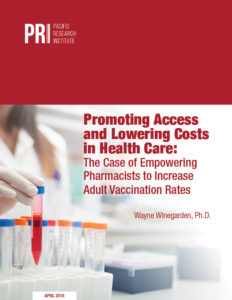Patients could save time and money if federal law is reformed to allow pharmacists to administer all CDC recommended vaccines, a new study released today by the Pacific Research Institute found.
Click here to download a copy of the study.
“Adult vaccines can improve people’s health, but our nation’s vaccine rates are unacceptably low. Making vaccines more accessible and less expensive will help reverse this trend,” said Dr. Wayne Winegarden, author of “Promoting Access and Lowering Costs in Health Care.”
Too many people become sick, are hospitalized, or die from vaccine-preventable illnesses each year. For example, about 900,000 people get pneumococcal pneumonia each year, leading to 400,000 hospitalizations and 19,000 deaths.
The recommended “herd immunity threshold” to stop the spread of a disease is typically 95 percent, but the Centers for Disease Control and Prevention found that adult vaccination rates are very low. The target vaccination rate for the pneumonia vaccine for patients 65 years or older is 90 percent, yet less than 64 percent of older Americans are vaccinated today.
Right now, pharmacists are subject to a patchwork of laws in each state that are effectively barriers to vaccines being administered at neighborhood pharmacies. While flu shots are readily available, other commonly-prescribed vaccines such as the shingles vaccine or pneumococcal pneumonia, are not. This access barrier exists even though pharmacists receive vaccination training in their pharmacy school education.
Among the findings of Winegarden’s study:
- Reforming the system would increase vaccination rates and would allow patients to obtain vaccines at more convenient hours, such as lunchtime, evenings, or weekends.
- In a comparison, pharmacies were found to administer vaccines at lower costs than doctor’s offices and medical clinics. For example, one study found that it costs $208.72 on average to receive a shingles vaccine at a doctor’s office, versus $168.50 at a pharmacy.
- Reform would let patients get vaccines much closer to their homes or offices, as pharmacies are typically just a short drive away. It would also improve access to health care in rural areas, which often don’t have convenient access to doctors and clinics.
“In many states, outdated state laws unjustifiably limit patients’ access to vaccinations from providers who may be more convenient and less expensive,” Winegarden said. “By reforming the laws, patients can get their next shingles or pneumonia shot at their neighborhood pharmacy – and save money, too!”

